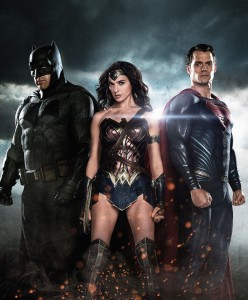 (File this under the “better late than never” category.)
(File this under the “better late than never” category.)
Hollywood is comic book movies. Comic book movies are Hollywood. The fit seems both natural and perverse. Every film is about the suspension of disbelief. Graphic novels are visual representations that transition simply to the screen now that computer and traditional effects are strong enough to depict them. But, if we are honest, few comic book films strive to be cinematic art. For me, an excellent film has to provoke thought. It has to transport the viewer, not just visually, but intellectually and emotionally. There are only one or two comic book films that come close. Most of them don’t even attempt to move beyond the visual spectacle. To its credit, Batman vs. Superman: Dawn of Justice makes an effort to transcend the type.
The film starts with a minimal origin story, but quickly moves to Batman/Bruce Wayne’s (Ben Affleck) perception of the events at the end of the Man of Steel. A Wayne Enterprises office and some of its employees join the ruins and the lost souls in Metropolis. The carnage convinces Wayne, and eventually the government, that Superman (Henry Cavill) could be a threat instead of a savior. Lex Luthor (Jesse Eisenberg) tries to manipulate the “god” and the “man” into a confrontation. Diana Prince (Gal Gadot) lurks around the periphery and her alter ego, Wonder Woman, eventually plays a supportive, but important, role. Lois Lane (Amy Adams) is present but does little.
Ultimately, Batman vs. Superman demonstrates an interesting suspicion of power. Bruce Wayne is convinced that Superman is too strong and could become a threat to the planet he has sworn to protect. Clark Kent believes Batman is a lawless vigilante that is indeed a dark and un-shining knight. The conflict is built on misunderstanding as opposed to well found truths. Luthor uses the mist surrounding the heroes to construct the battle between them, while Wonder Woman eventually works to defuse it.
Batman vs. Superman‘s reach exceeds its grasp. An air of artificiality pervades the conflict, which is not developed well enough to feel genuine. Batman, as we find him in this universe, disentangled from Christopher Nolan’s superior trilogy, is thinly drawn and morose. Batman should be dour, but with cause. Instead of a realized character, we have vague impressions and not meaningful motivations. Yet another Batman origin story does little to anchor Affleck’s performance, which in itself is not bad, but limited by the material. Cavill’s Superman looks the part, but seems stunted. As seen in The Man from U.N.C.L.E., Cavill oozes charm and sophistication in the right role. Perhaps Superman’s sometimes oppressive earnestness does not mesh well with his skills, or maybe the script left him too little. Either way, neither of our leads shine.
The supporting players are a mixed bag. Eisenberg’s Lex Luthor is a spastic amalgam. He fails to radiate brilliance or venom, but only an awkward energy that smacks of an introvert hopped up on Red Bull attempting to appeal to a prom date. Gal Godot is more successful as Wonder Woman. She looks the part of a powerful princess and her fight scenes more than hint at her lethal dexterity. She has more than a cameo, but too little screen time to be a character.
In the end, Batman vs. Superman is an awkward bridge between Man of Steel and upcoming films revolving around Wonder Woman and the Justice League. Maybe we will look back at it as a successful launching pad, but as a stand alone film, it struggles to satisfy. The DC Universe is trying to cut too many corners. This film, building on top of single films that more fully developed both Affleck’s Batman and Gadot’s Wonder Woman, could have leaned on known commodities so that the conflict between Batman and Superman might have resonated. Instead, too much is shoehorned into this narrative.
Grade: 1/3 Eggheads
 Bert Wheeler
Bert Wheeler
 Jeff Haymond
Jeff Haymond
 Marc Clauson
Marc Clauson
 Mark Caleb Smith
Mark Caleb Smith
 Tom Mach
Tom Mach